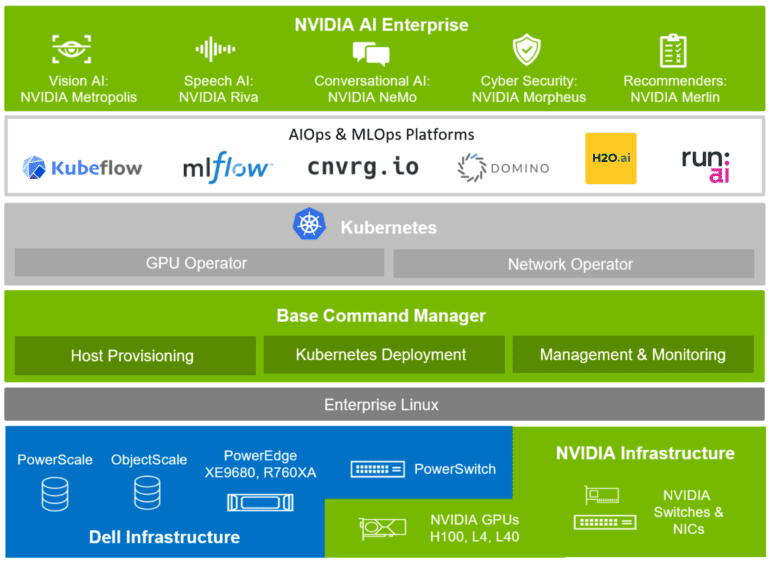TL;DR:
- Dell and Nvidia are partnering on Project Helix to bring generative AI to on-premises enterprise deployments.
- Project Helix combines hardware, software, and services to leverage large language models (LLMs) and generative AI.
- The initiative includes validated blueprints and reference deployments for deploying generative AI workloads.
- Dell PowerEdge servers will benefit from Nvidia H100 tensor core GPUs, integrated with Dell PowerScale and Dell ECS enterprise object storage.
- The software stack includes Nvidia AI Enterprise and capabilities from the Nvidia NeMo framework.
- Project Helix aims to enable LLMops by providing pre-trained foundational models for enterprise use cases.
- The collaboration between Dell and Nvidia goes beyond hardware solutions, focusing on easily replicable pre-trained models.
- Blueprints under Project Helix guide enterprises in deploying customized generative AI workloads.
- Optimizing models for real-time latency and throughput is a challenge addressed by the initiative.
- Dell hardware allows organizations to benefit from generative AI deployments in various locations.
- Project Helix, symbolized by the name “Helix,” aims to transform enterprises and unlock possibilities through generative AI.
Main AI News:
Dell and Nvidia are embarking on an extensive collaboration through Project Helix, an ambitious initiative that aims to introduce the influential capabilities of generative AI to on-premises enterprise deployments. By combining their hardware, software, and services, the two industry giants aim to equip organizations with the tools and resources needed to harness the potential of large language models (LLMs) and generative AI. To facilitate this, Project Helix will offer validated blueprints and reference deployments that guide enterprises in effectively deploying generative AI workloads.
On the hardware front, Dell PowerEdge servers, including the PowerEdge XE9680 and R760a, will be fortified with Nvidia H100 tensor core GPUs. This integrated hardware stack will seamlessly merge with Dell PowerScale and Dell ECS enterprise object storage. The software stack will comprise Nvidia AI Enterprise, along with capabilities derived from the Nvidia NeMo framework for generative AI.
Until now, much of the progress in generative AI has revolved around cloud-based solutions. However, Project Helix recognizes that not all enterprises prefer cloud-based workloads. With the new initiative, Dell and Nvidia aim to bring the benefits of security and privacy directly to enterprise customers, providing them with the option to leverage LLMs on premises.
Kari Briski, VP of software product management at Nvidia, expressed the rationale behind this approach, stating, “Every enterprise needs an LLM for their business, so it just makes sense to do this on premises.” Project Helix endeavors to enable LLMops (Large Language Model operations) for enterprises, acknowledging that many organizations can achieve their objectives by customizing a pre-trained foundation model to align with their specific data and requirements.
Briski acknowledged the pervasive hype surrounding the term “generative AI” and emphasized that the collaboration between Dell and Nvidia goes beyond mere hardware solutions. The primary objective is to offer easily replicable pre-trained foundational models, streamlining the adoption and operationalization of LLMs for enterprise use cases.
Under the Project Helix framework, blueprints will serve as a comprehensive guide, aiding enterprises in deploying generative AI workloads that can be tailored to their unique contexts. Often, organizations face challenges when it comes to optimizing models for real-time latency and throughput. Varun Chhabra, SVP for product marketing for the infrastructure solutions group and telecom at Dell, highlighted the importance of understanding how computing, storage, and networking interact to enable real-time generative AI workloads. The Project Helix initiative encapsulates best practices in determining the optimal combination of computing resources.
Conlcusion:
The collaboration between Dell and Nvidia through Project Helix signifies a significant development in the market for generative AI in on-premises enterprise deployments. By combining their expertise in hardware, software, and services, the two companies are empowering organizations to leverage the potential of large language models and generative AI. The provision of validated blueprints and reference deployments offers a clear roadmap for enterprises to adopt and deploy customized generative AI workloads. This partnership not only addresses the demand for security and privacy in enterprise settings but also paves the way for easily replicable pre-trained models, simplifying the operationalization of generative AI for businesses.
The introduction of Dell PowerEdge servers with Nvidia tensor core GPUs, integrated with enterprise object storage, reinforces the hardware capabilities required for successful implementation. With Project Helix, enterprises can optimize their models for real-time latency and throughput, ensuring efficient and effective utilization of generative AI. Overall, this collaboration signifies a significant step forward in the market, providing enterprises with the tools and resources necessary to unlock the transformative potential of generative AI in various deployment scenarios.

